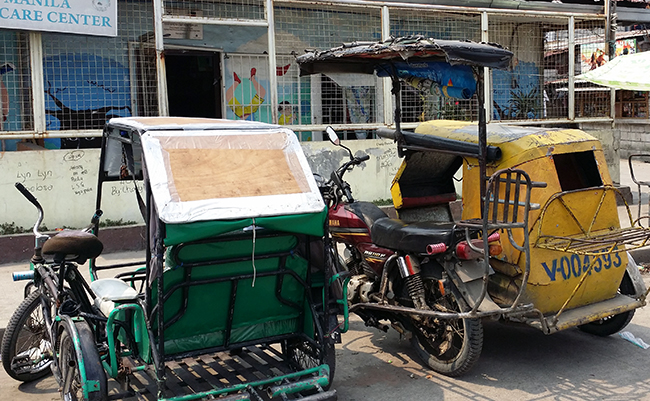Jeepneys, Fried Bananas, and Jungle Jim

The story goes that, while my mom was in the hospital after giving birth to me, my dad made fried bananas for my siblings. It wasn’t by any means an act of culinary, intercultural prowess. Rather, it was experimentation on the part of a frazzled father to come up with something interesting that his kids would eat.
As I was told by my siblings, they certainly were interesting, but they weren’t very good.
Nor were the fried peas dad tried to sell them.
The fried bananas have long been an inside joke among us four Steinhage kids. They’re remembered fondly for the effort if not for their taste. My dad is 100 per cent German born and bred; I haven’t the slightest idea where he got the idea to fry bananas. Nor peas, for that matter. Even though I shared verbally in the joke, I’ve always felt a bit left out.
I never got my fried bananas.
Until, that is, I traveled to the Philippines this fall as part of the Egan Journalism Fellowship.
I finally got them – done in authentic Filipino style – one morning when they were included in the breakfast buffet at the hotel in which I and the other three Egan fellows were staying.
Before I dug in, I snapped a picture of them and sent it to my siblings. “You guys got your fried bananas a la Dad. I finally got my fried bananas a la our hotel cook,” I wrote.
I have to say, I really enjoyed them.
Not only did they taste good, but they felt good in the sense that they were a throwback for me. In fact, my entire trip to the Philippines was a throwback. The purpose of the Egan fellowship was to report on the relief and reconstruction programs run by Catholic Relief Services in the aftermath of Super Typhoon Haiyan.
And I did that. But, along the way I encountered some things from my past that left a deep impression on me.
Take the Jeepneys, for example. A Jeepney is a kind of open-concept bus that carries passengers on routes throughout the Philippine cities. Passengers jump in the back at the stops and pass their fares one-to-one up to the driver.
The original Jeepneys were converted from the jeeps left behind by the US Military after World War II. Resourceful as they are, the Filipinos used them for public transportation. They became so popular that the Filipinos figured out how to extend the backs in order to fit in more passengers.
Today’s Jeepneys, many of which are privately owned, are colorfully painted and elaborately decorated. It’s not unusual to find the Blessed Mother, Jesus, or one of the saints painted on one or more sides.
The Jeepneys reminded me of my dad, who served as a naval engineer in California during World War II. Perhaps some of the pre-Jeepney jeeps shipped to the Philippines passed through the port as which Dad worked.
I still have my dad’s Navy hat, leggings, backpack, and ditty bag. They’re a real treasure to me.
And then, there’s Jungle Jim. I didn’t see him in the Philippines, but I felt his presence everywhere I went.
Jungle Jim is the nickname for a man who was a family friend when I was a kid. I still don’t know his real name. He worked for a company that was laying power cables on the ocean floor – at least that’s what hangs in my memory – and so he traveled to exotic places and did adventurous things as part of his job.
Jungle Jim had a soft spot in his heart for me. I was a sickly child, and there were doubts as to whether I’d grow up to be a healthy adult. So, Jungle Jim shared with me the world he felt sure I’d never see by writing me frequent and long letters about his experiences. He’d send pictures, too. That’s quite something when you consider this was before email or social media and in the era of costly and tedious airmail.
Through his correspondence, Jungle Jim took me on scuba diving adventures that included facing a squid that shot ink at him, trekking through jungles (hence the nickname), riding pedi-cabs (bicycle-powered taxis) and climbing coconut trees. He took me throughout Asia – Taiwan, Thailand, Cambodia. Viet Nam, and the Philippines.
After my mom died this summer, my sister and I found a pair of carved wooden wall hangings that had been a gift to my family from Jungle Jim. When we turned them over, we saw that they’d been made in the Philippines.
Jungle Jim had written all those letters under the assumption that he was telling me about a world that I’d never see.
And there I was, trekking around the Philippines just as he had done almost fifty year earlier and having my own wonderful adventures.
It’s interesting – and beautiful – how God does that. He weaves our lives into a lovely, albeit sometimes difficult, tapestry that is both intricate and holy. Usually, we can see only the back of it with its mixed-up switch-swatch of threads and knots.
Certainly at the end of our lives we’ll be able to see the front of the tapestry and perceive the pattern that God has been weaving for us all our lives long.
Once in a while, though, we get a brief glimpse of the tapestry’s front while we’re yet alive.
I got a glimpse of mine while I was in the Philippines. It contained Jeepneys, fried bananas, and Jungle Jim.













